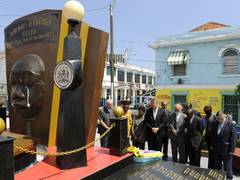Jamaican politicians greet ecumenical delegation as peace convocation opens

WCC general secretary Tveit led a prayer at Kingston's monument for children who died under violent circumstances.
Jamaican national leaders welcomed a global ecumenical delegation on Monday as the week-long International Ecumenical Peace Convocation (IEPC) began unfolding in Kingston.
The delegation comprised leaders from the World Council of Churches (WCC), Caribbean Conference of Churches (CCC) and Jamaican Council of Churches (JCC) who attended a series of meetings with Jamaican authorities.
The Rev. Dr Olav Fykse Tveit, WCC general secretary, briefed Jamaican Prime Minister Bruce Golding on the history of the WCC and the IEPC, a gathering of some 1,000 worldwide faith leaders and peace practitioners exploring the concept of just peace and recent advances in peacemaking practices.
Golding offered a warm welcome, expressing his wishes that the IEPC be “an inspired and inspiring event.” He emphasized the crucial role of both the church and state in the ethical development of societies worldwide today, especially in contexts – as in his own country – marked by crime and violence.
Sir Patrick Allen, governor general of Jamaica, added his joy, on behalf of Jamaica and the entire Caribbean region, to be hosting such a significant event.
The IEPC's location in Jamaica is an intentional acknowledgement of the region's involvement in the Decade to Overcome Violence, explained CCC general secretary Gerard Granado. Kingston was one of the focus capitals of the WCC’s “Peace to the City” campaign launched in Johannesburg, South Africa, in 1997.
Before the delegation, Allen pointed out the fact that crime and violence are treated as the most important items on both government and church agendas in Jamaica today. Allen, an ordained pastor and former head of the Seventh Day Adventist Church in Jamaica, recalled the “ultimate sources of peace offered by the gospel” that inspire Christians worldwide to commit to peace talks and processes worldwide. He affirmed that “there is nothing wrong in Jamaica today that cannot be fixed by what is right.”
His optimistic approach inspired a vice-moderator of the WCC Central Committee, the Rev. Dr Margaretha Hendriks-Ririmasse, to call on churches to search for mutual collaboration between governments worldwide.
“People are losing faith in Christianity. We must rescue the interest of people in the gospel by showing how we can work together in this world,” she said.
Jamaican parliamentary opposition leader Portia Simpson-Miller – one of the country's most popular politicians – also received a visit from the ecumenical delegation and listened to a brief introduction on the goals of the IEPC.
Simpson-Miller, who was the first female prime minister of Jamaica, is also a member of the Council of Women World Leaders. She said that the churches play a “very crucial role” in the transformation of all forms of hostility witnessed in the country.
Reflecting on Simpson-Miller's thoughts, Metropolitan Prof. Dr Gennadios of Sassima (Limouris), the other vice-moderator of the WCC Central Committee, said that one of the goals of the IEPC is to have a concrete impact on Jamaica’s struggle to overcome violence.
Remembering young victims of violence
During a short visit to a monument in downtown Kingston in memory of children who have been killed under violent circumstances, WCC general secretary Tveit led a prayer for the numerous young victims who have had their names recorded there since 2008.
“Maybe if these children can be remembered daily, less will die in the future,” said Maria Salesmen, a representative of the Kingston & St. Andrew Corporation and member of the board of the JCC.
The delegation wrapped up its official visits at the Supreme Court of Jamaica, where Chief Justice Zaila McCalla offered insights on just peace.
A dialogue about building peace and the judiciary system of Jamaica led the Rev. Dr Walter Altmann, moderator of the WCC Central Committee, to make a comparison between the situation in his home country, Brazil, and Jamaica.
“When the judiciary system is too slow, there is a growing feeling of impunity in society,” he said. “Therefore, we must support all initiatives in which the judiciary system becomes faster without harming people’s rights and, thus, help to more effectively deter crime and corruption.”
The IEPC opens on Wednesday, 18 May and concludes on 25 May.
High resolution photos of the visit may be requested free of charge via photos.oikoumene.org



